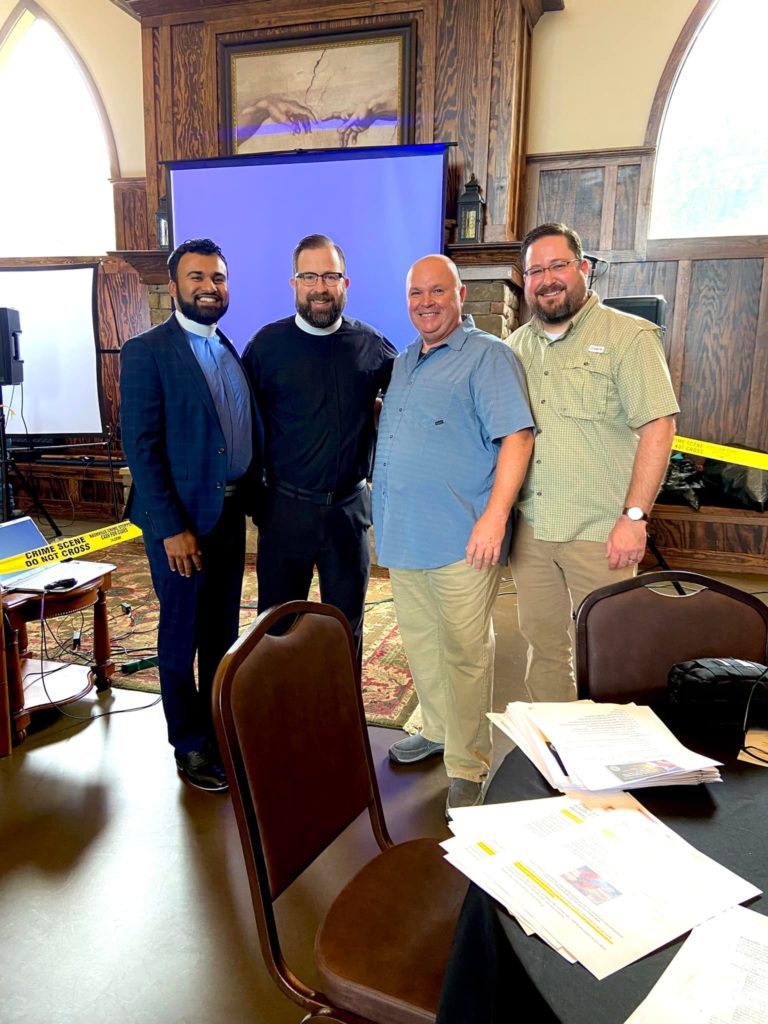In the first seven months of 2022 alone, 356 mass shootings have occurred in the United States, with four occurring in Christian churches. “Over the last few years, I think we have all become more aware and concerned about the rise in violence in our society. Targeting the innocent in public places such as schools, shopping centers, churches, and other places of worship has weighed heavily on many of our hearts,” said Fr. Chris Findley, Rector of St. Patrick’s Anglican Church in Murfreesboro, Tennessee.
On July 16, 2022, approximately 70 individuals from the southeast gathered at St. Patrick’s Anglican Church to attend an active shooter response training led by Lt. Jim Stephens, a member of St. Patrick’s. Lt. Stephens has 42 years of experience as a sworn police officer with 35 of those years as a Lieutenant. He has accumulated several awards and commendations and has a wide range of certifications, including Active Shooter Response, Street Survival Training for Law Enforcement Officers, and Leadership Training for First-Line Supervisors, Mid-Managers, and Command-Level Supervisors (Law Enforcement), to name a few.
Lt. Stephens was initially certified in Citizen Response to Active Shooter Events, developed by Texas State University. While it is a practical course introducing civilians to the Run, Hide, Fight concepts of surviving an active shooter event, he felt the course could be updated and improved. He added information from his experience in law enforcement and updated the training and response guidelines developed by state and federal agencies. “My goal was to include real-life scenarios, videos, and situational awareness training that would also benefit participants, should they find themselves in any critical or life-threatening event,” said Lt. Stephens. “It includes information and techniques that do not require heightened physical agility or specialized equipment to increase the chances of surviving a life-threatening event.”
Attendees of Lt. Stephens’ training can expect to learn more information on how human behavior during high-stress situations contributes to the success or failure to survive, how a single individual can aid in the survival of others, how to develop and implement safety/security teams, how to develop safety policies and procedures for houses of worship, and how to prepare for worst-case scenarios adequately. While the training is tailored to active shooter situations in places of worship, the techniques learned at these training sessions can be applied to active shooter situations in any public scenario, from schools to restaurants to shopping centers.
“I would absolutely recommend that every parish or plant in our diocese go through this training,” said Fr. Chris Findley. “The goal of this training is to build awareness in public spaces and develop the basics of decision making that can increase one’s chance of surviving such an attack. It is crucial that we (as individuals and as churches) think through our response before this happens – praying all the time that it won’t. We do not want to alarm or live in fear, but we want to be as prepared as we can be in the face of such an event.”
Lt. Stephens’ training can be seen in practice at his home church – St. Patrick’s. “We have individuals during every worship service that watch the entrances, parking lot, and the congregation,” said Fr. Chris Findley. “We also installed security cameras that cover our exterior property. Our safety team watches for any suspicious activity and is also trained in First Aid and CPR so they can assist in the event of a medical emergency. Our congregation has appreciated the training from Lt. Stephens as well as the presence of the Safety Team.”

From left to right: Canon Sean George, Fr. Chris Findley, Lt. Jim Stephens, and Fr. Wesley Brown
Lt. Stephens hosts active shooter response trainings as his own personal ministry. “I offer this training to any business, organization, or community group that wishes to learn more information or training to survive active shooter events, life-threatening situations, and how to reduce the chance of becoming a victim of crime,” says Lt. Stephens. “I am constantly updating my training to include data and concepts in situational awareness, active shooter response, crime prevention, and community engagement. My life has been devoted to serving the community and assisting any person, agency, or group needing any service I can provide.”
Looking to the future, ADOTS hopes to prepare more churches for active shooter situations. “In the time that we are in, our parishes must form security teams that are constantly working to prevent and prepare for the invasion of an armed intruder,” said Canon Sean George. “We hope to offer more trainings across our diocese to inform our parishes and educate them on what to do if an active shooter situation occurs.”
REFERENCES
https://research.lifeway.com/2020/02/12/how-frequently-do-church-shootings-occur/
https://www.gunviolencearchive.org/query/0484b316-f676-44bc-97ed-ecefeabae077
